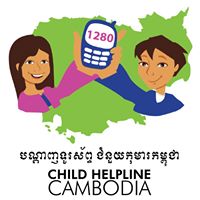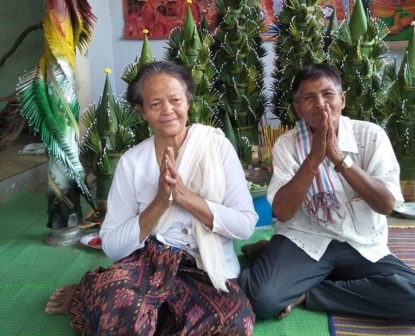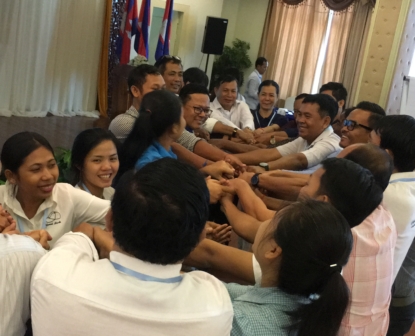Project
Empowering Rainbow Voices
-
Amount Funded
187,023 EUROProject Duration
01 Apr 2018 - 30 Sep 2019 -
-
Lead organisation
Partners
CamASEAN
-
Arising from an identified need for children and young people in Cambodia to have access to confidential counseling and referral telephone service, more than eight United Nations, international and local NGO representatives established Child Helpline Cambodia (CHC). Helplines operating globally have established an effective child protection foundation and continue to play a vital role in promoting children’s rights to survival, protection, development and participation. CHC is the first of its kind in Cambodia. In September 2011, CHC achieved full membership with Child Helpline International and joined a global network of over 150 child and youth helplines. CHC is an independent national NGO officially registered with the Ministry of Interior on 12 July 2012. In August 2016, CHC receives national accreditation by the Cooperation Committee of Cambodia, in compliance with the Standard of Good Governance and Professional Practice. In January 2017, CHC received a global Stars Impact Award by the United Kingdom Stars Foundation, in recognition of the positive impact it has provided Cambodian children, young people and their families. CHC focuses on a wide range of children’s rights as outlined in the United Nations Convention on the Rights of Children, but specifically for the children’s right to be heard and for each young person to be able to freely express their views (Article 12), children’s rights to freedom of expression (Article 13), children’s rights to appropriate information (Article 17), and the whole range of protection rights which is best encapsulated in Article 19. CHC works to this mandate and aims to support any child or youth who calls in, is threatened by or experiencing the most serious forms of abuse, and needs either someone to talk to or a referral to appropriate services. CHC provides a free, national, professional phone-counseling and information service and effective referral and follow-up with the aim of promoting active participation by children and youth, communities, NGOs and government departments/personnel to protect and empower children and youth. The installation of multiple channels for accessing counseling services # phone lines, text messages, emails, and social media # enables children and youth to select the communication channel that best suits their needs and/or resources, benefiting from a helpline service, which they can directly access, rather than waiting for adults to take action on their behalf. Today most children and youth contact CHC by mobile telephones. In 2016, the total number of calls was 168,235; an average of 460 calls every day. Acting in the best interests of the child and youth at all times, CHC has responded to children and youth who want to commit suicide, who are being trafficked, exploited, experiencing physical, sexual and emotional abuse and violence or request information.
-
Organisation
Arising from an identified need for children and young people in Cambodia to have access to confidential counseling and referral telephone service, more than eight United Nations, international and local NGO representatives established Child Helpline Cambodia (CHC). Helplines operating globally have established an effective child protection foundation and continue to play a vital role in promoting children’s rights to survival, protection, development and participation. CHC is the first of its kind in Cambodia. In September 2011, CHC achieved full membership with Child Helpline International and joined a global network of over 150 child and youth helplines. CHC is an independent national NGO officially registered with the Ministry of Interior on 12 July 2012. In August 2016, CHC receives national accreditation by the Cooperation Committee of Cambodia, in compliance with the Standard of Good Governance and Professional Practice. In January 2017, CHC received a global Stars Impact Award by the United Kingdom Stars Foundation, in recognition of the positive impact it has provided Cambodian children, young people and their families. CHC focuses on a wide range of children’s rights as outlined in the United Nations Convention on the Rights of Children, but specifically for the children’s right to be heard and for each young person to be able to freely express their views (Article 12), children’s rights to freedom of expression (Article 13), children’s rights to appropriate information (Article 17), and the whole range of protection rights which is best encapsulated in Article 19. CHC works to this mandate and aims to support any child or youth who calls in, is threatened by or experiencing the most serious forms of abuse, and needs either someone to talk to or a referral to appropriate services. CHC provides a free, national, professional phone-counseling and information service and effective referral and follow-up with the aim of promoting active participation by children and youth, communities, NGOs and government departments/personnel to protect and empower children and youth. The installation of multiple channels for accessing counseling services # phone lines, text messages, emails, and social media # enables children and youth to select the communication channel that best suits their needs and/or resources, benefiting from a helpline service, which they can directly access, rather than waiting for adults to take action on their behalf. Today most children and youth contact CHC by mobile telephones. In 2016, the total number of calls was 168,235; an average of 460 calls every day. Acting in the best interests of the child and youth at all times, CHC has responded to children and youth who want to commit suicide, who are being trafficked, exploited, experiencing physical, sexual and emotional abuse and violence or request information.
-
Project
The project Empowering Rainbow Voices is driven by media research that considers the Cambodia LGBTI population as potential target consumers, an innovative approach in the country and indeed, an innovative approach globally. In helping the project team members to be confident in their understanding of how LGBTI communities find, consume and understand media, Child Helpline Cambodia works with a local LGBTI advocacy group, CAMASEAN (also a Voice grantee in their own right) s to design and deliver a campaign to help certain intersectional LGBTI communities, such as gay women who have been trafficked and transgender youth who have faced violence to make them aware of their legal and human rights. The project team also hopes to test at least one digital platform potentially an online or mobile service that provides in-depth, free legal information and information about human rights to help LGBTI people access the information they need to self-advocate and make better decisions. Through these empowering mechanisms, the project creates environments that encourage LGBTI people to safely mobilise and increase their political participation throughout the country.
The overall goal of this project is to create an evidence base on how to effectively communicate the legal rights LGBTI people have in Cambodia, especially to women and youth, and including, for example, those who face particular hardship as a result of living and working on the street, experiencing trauma, or suffering from depression. The primary outcome will therefore be a thorough understanding about how to effectively message content and provide mechanisms to empower LGBTI intersectional communities.
-
-
The project Empowering Rainbow Voices is driven by media research that considers the Cambodia LGBTI population as potential target consumers, an innovative approach in the country and indeed, an innovative approach globally. In helping the project team members to be confident in their understanding of how LGBTI communities find, consume and understand media, Child Helpline Cambodia works with a local LGBTI advocacy group, CAMASEAN (also a Voice grantee in their own right) s to design and deliver a campaign to help certain intersectional LGBTI communities, such as gay women who have been trafficked and transgender youth who have faced violence to make them aware of their legal and human rights. The project team also hopes to test at least one digital platform potentially an online or mobile service that provides in-depth, free legal information and information about human rights to help LGBTI people access the information they need to self-advocate and make better decisions. Through these empowering mechanisms, the project creates environments that encourage LGBTI people to safely mobilise and increase their political participation throughout the country.
The overall goal of this project is to create an evidence base on how to effectively communicate the legal rights LGBTI people have in Cambodia, especially to women and youth, and including, for example, those who face particular hardship as a result of living and working on the street, experiencing trauma, or suffering from depression. The primary outcome will therefore be a thorough understanding about how to effectively message content and provide mechanisms to empower LGBTI intersectional communities.
-
“I am proud to be a transman and want to be recognised legally as a person so that I can support and help others, especially minority and marginalised groups at national and international level.”
Long Malen.
“I am proud to be a transman and want to be a Khmer art teacher who can support and help other LGBTI people, mobilise and strengthen more LGBT communities in the city and provinces”.
Noy Sitha From the project, some videos on tips to go about some various life situations were shared on FaceBook. Tips on Coming out to the public for LGBTQI Tips on Seeking for a job and employment for LGBTQI people Tips on Child adoption for LGBTQI Through this project the following results were achieved;
- 2 local CSOs and 2 INGOs had been working together as a consortium with financial support, knowledge, skills, and networks to strengthen their capacity for behaviour change and policy influencing to promote the rights of LGBTIQ in Cambodia.
- Desk research followed by a discovery trip and a co-design workshop were achieved to find out the comprehensive view of how LGBTIQ communities across sexual orientation, gender expression, sex, age, urban/rural residence and socioeconomic class consume media.
- A Facebook group, page and youtube channel were launched since 8th March 2019. The Facebook groups and page were created to share LGBTIQ resources, information on rights, advocacy campaigns and create a sense of wider community among intersectional LGBTIQ communities is named (ការពិត)which, in English, means BeYourTruth.
- Inception workshop, co-creation workshop, and media testing workshop were organised to prepare and develop 5 videos to support the viable, high-fidelity design of digital intervention and prototype of a digital solution, i.e. social media Facebook group and page, animated GIF (Call Me / Don’t Call Me), Audiovisual (#don’t forget to think), Video: Vox pop (an interview-style video), Video: 1+1 exchange (an interview-style video) to engage LGBTIQ with free professional counselling and information system.
- A team of 14 counsellors at Child Helpline Cambodia were trained with key knowledge in the provision of counselling to LGBTIQ.
- Resources that are highly visual and images with a brief text or videos were popular. The power of positive storytelling to share advice is something that has been very popular with the rightsholders. Small pieces of advice for how to deal with day to day discrimination and marginalisation have been much appreciated, especially if they come from a well-known or respected figure.
- Commune council has been so happy with psychological support with a non-judgmental platform where LGBTIQ people, their families and government officials can be engaged to understand the issues before they accept, protect, and support in-country level.
- The excitement of the project is to connect old, young and intersectional LGBTIQ through technology, which has added values and is cost-effective. The LGBTIQ from across the country and region have known and are connected to the project through social media. The approach was used to increase political participation at the local and commune level is new, as this type of intervention engaging intersectional LGBTIQ communities has never been implemented in Cambodia.
- Additionally, the consortium has been able to use a human-centred design methodology to reach the audience and design the solutions with them. This is an approach that is relatively new in the international development field generally and in Cambodia in particular. By co-creating with the rightsholders, they had designed a solution tailored to their needs and working with technology in a way that makes sense to them.
xxx
I am proud to be a transman and want to be recognised legally as a person so that I can support and help others, especially minority and marginalised groups at national and international level.” – Long Malen
“I am proud to be a transman and want to be a Khmer art teacher who can support and help other LGBTI people, mobilise and strengthen more LGBT communities in the city and provinces.” – Noy Sitha
The excitement of the project “Empowering Rainbow Voices” of Child Helpline Cambodia (CHC) is about connecting the old and the young through technology. The project was based on a new approach to increase political participation at the local and commune level of LGBTQI communities that had never been implemented in Cambodia before. It achieved several key results around promoting the rights of LGBTQI people in Cambodia by connecting LGBTQI people from across the country and the region on social media.
2 local CSOs and 2 INGOs worked together as a consortium on financial support, knowledge, skills, and network strengthening for behaviour change and policy influencing to promote the rights of LGBTQI in Cambodia. Desk research was followed by a discovery trip and a co-design workshop that uncovered of how LGBTQI communities consume media across sexual orientation, gender expression, sex, age, urban/rural residence and socioeconomic class. The consortium then used a human-centred design methodology to reach its audience and design solutions with them. By co-creating with rightsholders, the project team designed a solution tailored to their needs and working with technology in a way that makes sense to address rightsholders’ needs. This was followed by a media testing workshop to prepare and develop 5 videos to support the design of a digital intervention and prototyping a digital solution.
The approach was based on a social media Facebook group and page, animated GIF (Call Me / Don’t Call Me), audio-visuals (#don’t forget to think) and interview-style videos to engage LGBTQI with free professional counselling and information. The Facebook groups and page named “BeYourTruth” were created to share LGBTQI resources, information on LGBTQI rights and advocacy campaigns and create a sense of wider community among intersectional LGBTQI people. The resources that were highly visual, such as images with a brief text or videos, and the power of positive storytelling to share advice became very popular with the rightsholders. Small pieces of advice for how to deal with day-to-day discrimination and marginalisation were much appreciated, especially if coming from well-known or respected figures.
Moreover, among the project team there were 14 counsellors trained on key knowledge and skills in the provision of counselling services to LGBTQI people. Commune councils were happy with the psychological support provided by a non-judgmental platform for LGBTQI people, while both family members and government officials were engaged to increase acceptance, protection and support for this platform.
Videos on tips to go about various life situations were shared on Facebook:
- Coming out to the public for LGBTQI people:
https://www.facebook.com/Karpit.LGBTQI/videos/637918266629731/
- Seeking for a job and employment for LGBTQI people:
https://www.facebook.com/sophea.pheung/videos/2311350488927023/
- Child adoption for LGBTQI people:
https://www.facebook.com/sophea.pheung/videos/2308749472520458/
- News





